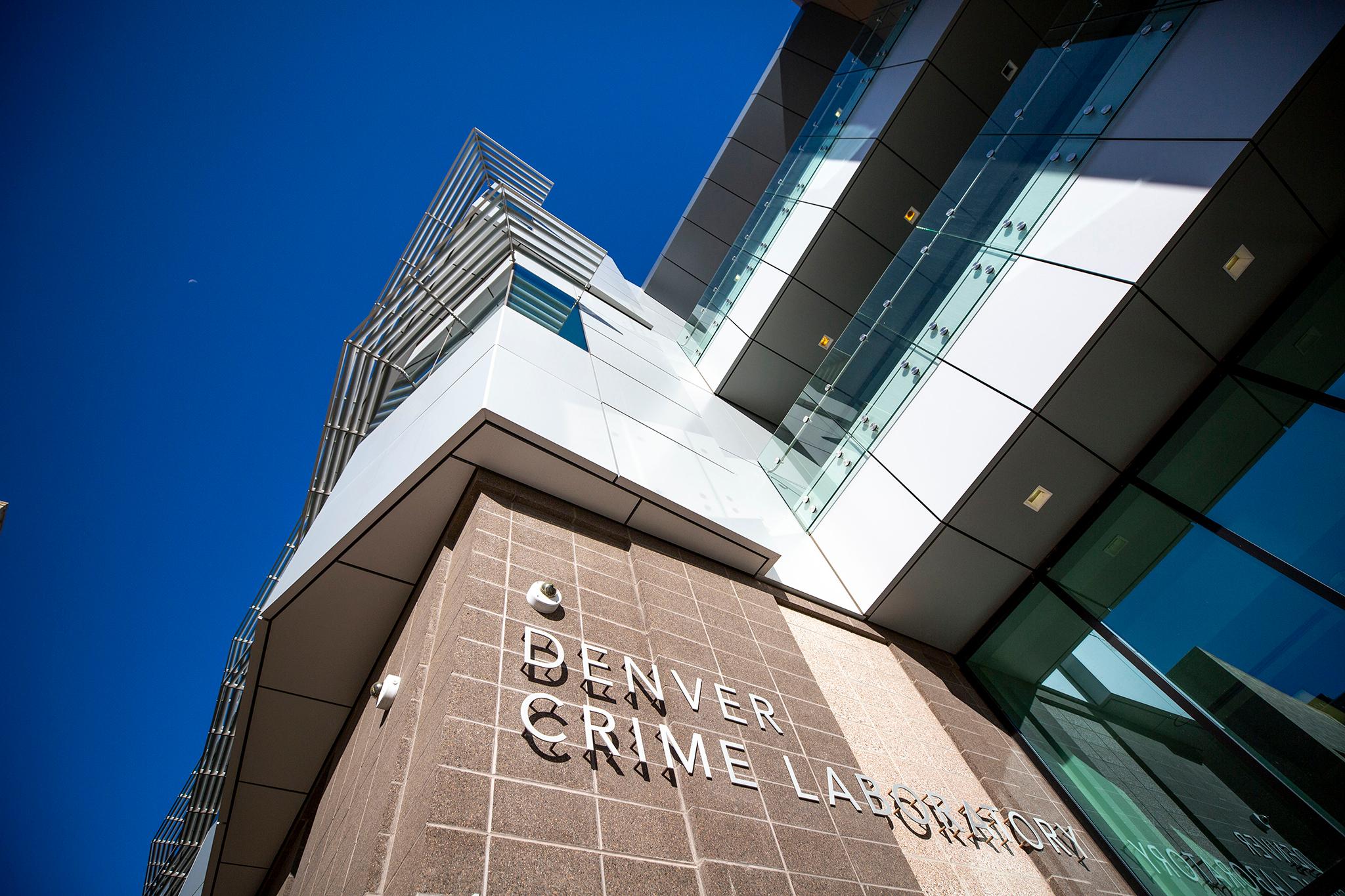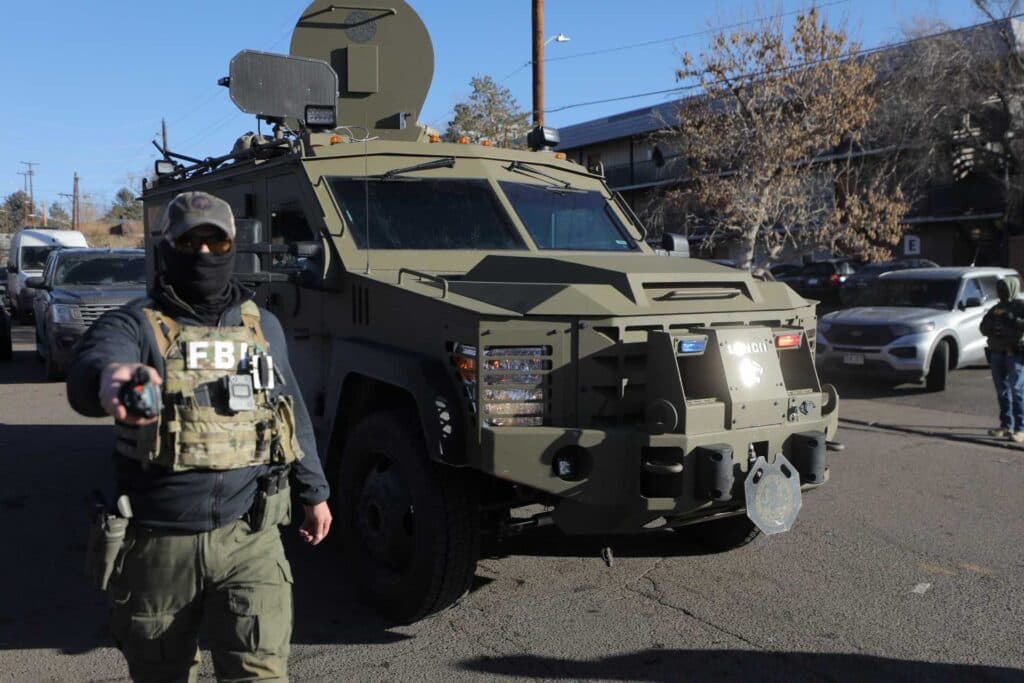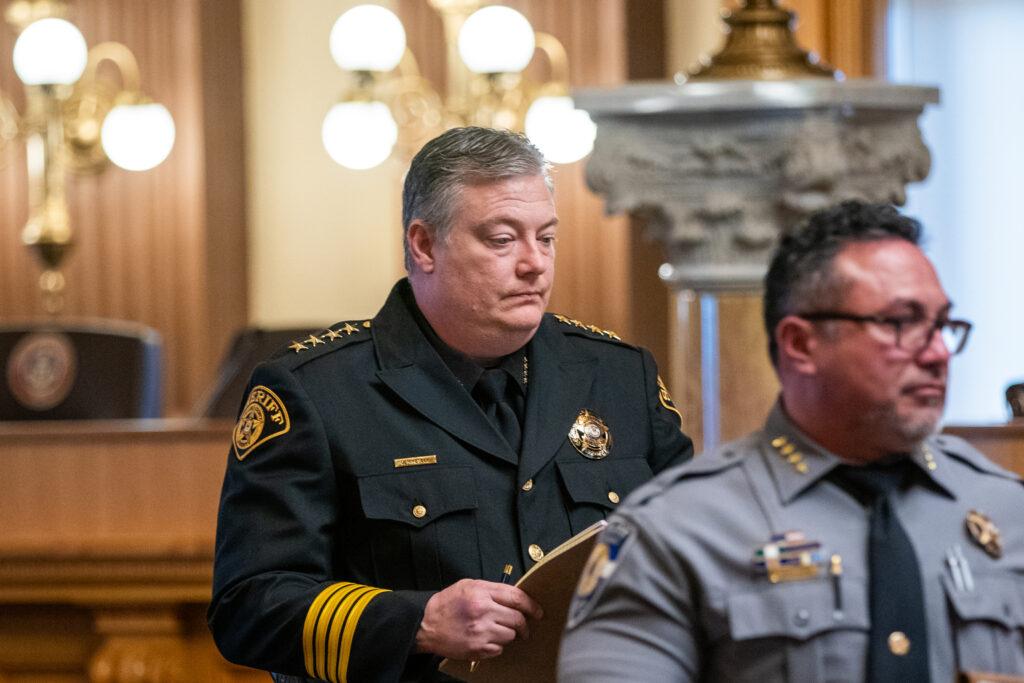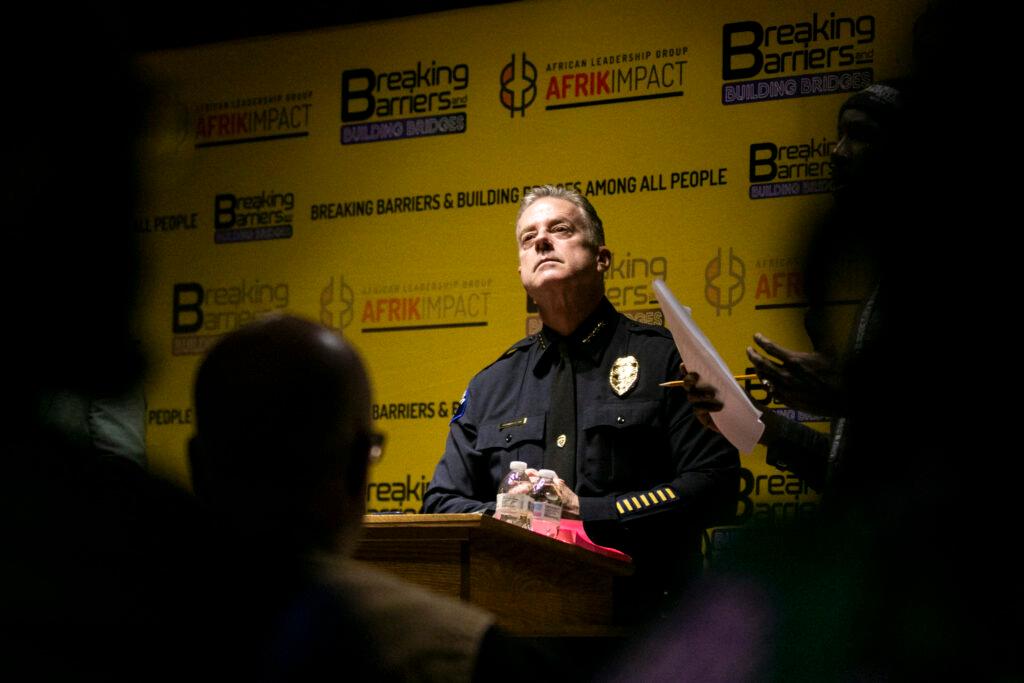
Robert Hawkins is a self-proclaimed pimp who trafficked teen girls for sex and kept the proceeds for himself. He used drugs and violence to control the women, who operated out of motels in Aurora, while he lived in a new apartment by Coors Field.
And without the federal cash that led to Hawkins’ arrest and paid for local police to investigate his crimes, he might still be in business today. Instead, he is serving a 448-year sentence in a state prison also partly funded with U.S. Justice Department grants.
Colorado law enforcement agencies, tribal governments and nonprofits have received more than $300 million since 2021 from the Justice Department and the organizations it oversees. Today, all of that is at risk in a decade-long debate over whether Colorado fits beneath the squishy, politically-charged-but-barely-defined title of “sanctuary state.”
Among the things at stake: Patrol cars in Huerfano County, Tasers for the town of Center, money for the forensic lab in Denver, rifle-rated armor in Buena Vista and new radios at the Delta County Sheriff’s Office. There’s also student loan repayment plans for some young prosecutors and substance abuse treatment programs in county jails.
State Attorney General Phil Weiser, who successfully sued the first Trump administration in a similar argument, said there are a lot of questions unanswered as the new administration issues threats.
“There isn’t a lot of clarity about what is going to happen. I’m somewhat in the dark about what this means, when this would be triggered or whether we’ll lose funding,” Weiser said. “If there are efforts to pressure us to violate our Constitutional rights, I’ll have to defend Colorado.”
The threat to Colorado’s federal justice funding arrived on the same February day that immigration agents and Justice Department officers fanned out across Metro Denver in search of people who had committed crimes while not lawfully present in the U.S.
Later that afternoon, newly-confirmed U.S. Attorney General Pam Bondi issued a memo ordering a review of grant funding to “sanctuary jurisdictions” — cities or states that Republicans say don’t fully cooperate with immigration enforcement.
“Sanctuary jurisdictions should not receive access to federal grants administered by the Department of Justice,” reads the memo. “...the Department may seek to tailor future grants to promote a lawful system of immigration, and to reduce efforts by state or local jurisdictions to undermine a lawful system of immigration.”
The Bondi memo cites a federal statute that defines sanctuary jurisdictions as those which fail to comply with: 8 U.S.C. § 1373(a).
“If you read the law itself, it sounds pretty confusing,” said CU Boulder professor P. Deep Gulasekaram, director of The Byron R. White Center for the Study of American Constitutional Law. “It purports to prohibit a state or local from prohibiting their officials from communicating with the federal government two specific types of information: citizenship and immigration status of an individual.”
Colorado does have laws that prohibit state and local employees, including law enforcement, from participating in ICE enforcement, but there’s no evidence that any police department or county sheriff’s office is not talking to ICE when they want to. And for years, Colorado jails have regularly informed ICE when inmates are released from custody so federal agents can pick them up on immigration violations.
Gulasekaram said the constitution also limits the U.S. government’s ability to compel the Denver Police Department, for instance, to spend its resources on immigration enforcement.
Bondi’s Justice Department review of states and cities is presumably still underway. But the department has already filed lawsuits in recent weeks in New York and Illinois over sanctuary policies. The suit in Illinois accuses Chicago, Cook County and the state of “making it more difficult for, and deliberately impeding, federal immigration officers' ability to carry out their responsibilities” by not “complying with immigration detainers or civil immigration warrants.”

Does Colorado do the same thing as Illinois or New York? Maybe. The state bars local sheriffs from holding people beyond the expiration of their sentence just to wait for ICE agents to pick them up. But current federal law doesn’t require them to.
Instead, local jails seemingly comply with federal law by notifying ICE when an inmate enters processing for release from a county jail. It’s up to the federal agency to get there in time and be waiting outside if they want to detain that immigrant further, perhaps for removal from the country. On occasions when they do not get to the jail in time, or make no effort at all, the former inmate returns to the community.
To date, no lawsuit has yet been filed against Denver or Colorado for “sanctuary” policies in this second Trump administration.
The DOJ didn’t return multiple requests for comment.
A spokeswoman for Gov. Jared Polis said Colorado just doesn’t fit into the Bondi definition of sanctuary states.
“Gov. Polis has been clear that Colorado will continue to work in compliance with state and federal law, with federal law enforcement agencies in apprehending dangerous criminals to make Colorado safer for everyone,” said Shelby Wieman, in a statement. “The federal government, if it’s committed to improving public safety, should continue important state funding that helps make Colorado and other states safer.”
Some Colorado counties go a little further than their metro counterparts in doing work for ICE, seemingly without encountering penalties from the state. In Teller County, which is west of El Paso County in the mountains, Sheriff Jason Mikesell has what is called a 287g agreement with ICE that allows him to “deputize” sheriff’s deputies to assume the duties of an immigration enforcement officer in various times. El Paso County is amid the training to be enrolled in the same program.
The deputized agents are not allowed to do civil arrests for ICE, however, and are only dealing with people who are suspected of committing crimes.
“I know the state doesn’t want to talk about it, but every single person who comes into a jail is asked where they’re born, where they live, where they come from, do they have a driver’s license? Social security numbers, that sort of thing,” Mikesell said, noting he then cross checks that information with lists furnished to him by the feds.”

Despite complaints from ICE about a lack of cooperation, a review of recent federal immigration cases shows that during the Biden years, some immigrants who disappeared into the community after arrest did so because ICE just failed to come get them, not through any conspiracy to protect the newcomer.
In 2022, for example, ICE was notified that David Erives-Garcia, who had been previously deported, was arrested in Montrose on charges of harassment.
ICE simply failed to take him into custody.
A year later he was arrested again by Montrose Police on similar charges, ICE put a detainer on him and he was taken into custody the next day.
Two weeks before Trump took office, on Jan. 10, Arnulfo Duron-De Luna tried to run from police in a stolen car, he was taken into custody after police used tactical maneuvers to disable the car, a passenger pointed a gun at the vehicle’s owners.
But for a month leading up to the incident, Duron-De Luna, who ICE knew was in the country illegally, sat in an Adams County jail. Federal authorities were alerted that he had violated probation on illegal reentry charges, but after he spent more than four weeks in jail Duron-De Luna was released back into the community. A day later he was arrested in Denver with the stolen car.
This time ICE took him into custody after he bonded out of the Denver jail.
What do the DOJ grants fund?
The Department of Justice grants from the Office of Justice Projects to various Denver city agencies and nonprofits in that city alone totalled $38 million from fiscal year 2021 to 2024.
In Colorado, the Justice Department has awarded grants worth more than $313 million since fiscal year 2021, from the Office of Justice Programs and Office on Violence Against Women.
The grants go to a wide variety of programs throughout the state, including an adult treatment court in Ignacio, Colo. managed by the Southern Ute tribe — $588,148 in 2023. Another $247,644 went last year to the Town of Frederick for rural and small department violent crime reduction.
Last year, $1.5 million went to Colorado Springs Police for body cameras. Millions more goes to clearing DNA backlogs, nurses trained to offer services to sex assault victims, and hate crime initiatives, according to data from the governor’s office, local agencies and the state attorney general’s office.
One of the largest grants is $20 million that went last year to the Colorado Department of Public Safety for crime victim assistance.
Every detention facility in Colorado is required to have a medication-assisted treatment program, which includes having methadone, suboxone and other medications in jails for substance-dependent people who need them.
The Denver District Attorney, which has utilized DOJ grants to successfully prosecute human traffickers like Hawkins, said in a statement that it had received no official communication from the Department of Justice.
“It is important to note that these grants fund critical initiatives, including our Human Trafficking Unit, Witness Protection Team, Cold Case Unit, and Family Violence Unit, all of which play a vital role in ensuring public safety in Denver,” a spokesman said, in an email.


In Aurora, where a troubled police department relies on DOJ grant money for everything from body cameras to youth violence prevention, officials are walking a fine line with millions of dollars at stake.
“What we don’t do is enforce immigration laws, that is not our role,” said Aurora Police Chief Todd Chamberlain, at a meeting with several dozen community leaders and migrants from African nations last week. “Our role is to make sure that people are safe, and that people who have been victimized feel safe enough to come to the police.”
But after waiting for the interpreter to finish translating in two different languages, Chamberlain immediately noted that he would use any and all federal resources at his disposal to keep the community safe.
“And if that means using HSI, DHS or ICE, I will use that resource,” Chamberlain said. “Because there are people who have come to this country whether documented or undocumented, that's not my concern, my concern is if those people who have come to this country and victimized other people of this community.”








